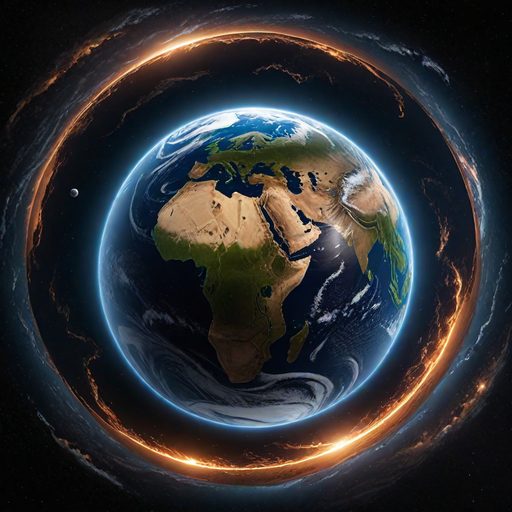
Has Climate Change Lengthened Earth’s Days
Recommended for Earth Science
Imagine our planet as a graceful ballerina, twirling in a celestial ballet. Each spin marks a day, a familiar rhythm that has lulled us into complacency. But, a shadow looms over this dance, a creeping change in tempo brought about by the melting polar ice caps.
It’s a subtle shift, measured in milliseconds, yet it speaks volumes about our planet’s fragility and the far-reaching consequences of climate change.
Yes, but imperceptibly so. We're talking milliseconds per century, not something you'd notice on your wristwatch.
The main culprit is the redistribution of mass caused by melting ice. But other factors, like the Moon's gravitational pull, also play a role.
Scientists use sophisticated techniques like Very Long Baseline Interferometry (VLBI) and the Global Positioning System (GPS) to track Earth's rotation with incredible precision. Is the Earth really slowing down?
What's causing this slowdown?
How can we measure such minute changes?
The Melting Clock: A Symphony of Ice and Time
Picture the Earth as a giant grandfather clock, its pendulum swinging steadily, marking the passage of time. But this clock is not immune to the effects of climate change. As polar ice melts, it’s as if we’re adding weight to the pendulum, slowing its swing and making the days slightly longer.
To understand this phenomenon, think of a spinning top. When it’s perfectly balanced, it spins smoothly. But if you add weight to one side, the top wobbles and slows down. The same principle applies to Earth. The melting ice, predominantly at the poles, redistributes mass towards the equator, affecting the planet’s moment of inertia – its resistance to changes in rotation.
The Earth’s shape, an oblate spheroid bulging at the equator, is also a factor. As ice melts and water flows towards the equator, it increases the bulge, further slowing the rotation. It’s a delicate interplay of mass and gravity, a cosmic ballet where even the smallest changes can have ripple effects.
The Fingerprint of Climate Change: A Slowing Pulse
Our planet is running a fever, its temperature rising due to the accumulation of greenhouse gases. This fever is melting the glaciers and ice sheets, not just at a steady drip, but at an alarming, accelerated pace. The consequences are far-reaching, affecting everything from sea level rise to the very rhythm of our days.
The Moon’s gravitational pull is another player in this cosmic drama. It tugs on the Earth’s oceans, creating tides and exerting a subtle braking force on our planet’s rotation. This tidal friction has been slowing Earth’s spin for eons, but now climate change is adding its own twist to the tale.
The combined effect of these forces is a symphony of disruption, a subtle yet significant shift in the Earth’s rotation. It’s a stark reminder that our planet is not a static entity but a dynamic system, constantly responding to internal and external forces.
The Future of Time: A Shifting Rhythm
Imagine trying to set your watch to a clock that’s constantly changing its pace. That’s the challenge facing scientists and engineers who rely on precise timekeeping for navigation, communication, and scientific research. The slowing of Earth’s rotation, while minute, can have significant implications for these fields.
To address this challenge, scientists are developing new timekeeping systems that take into account the Earth’s changing rotation. These systems, based on atomic clocks and other cutting-edge technologies, will ensure that our measurements of time remain accurate and reliable in the face of climate change.
The slowing of Earth’s rotation is more than just a scientific curiosity; it’s a call for introspection. It reminds us that we are not separate from the planet but intrinsically linked to its rhythms and cycles. It’s a reminder that our actions have consequences, not just for ourselves but for the delicate balance of our planet and the future of time itself.
The Everlasting Dance
The Earth’s dance will continue, its rhythm adapting to the changing climate. It’s a dance of resilience, a testament to the planet’s ability to withstand and adapt to change.
But as the stewards of this planet, it’s our responsibility to ensure that the dance remains harmonious and sustainable for generations to come.
Watch a video
The Day the Earth Slowed Down: How Climate Change is Messing with Time!
Curious Times is a leading newspaper and website for kids. We publish daily global news aligned to your learning levels (also as per NEP 2020): Foundational, Preparatory (Primary), Middle and Senior. So, check out the News tab for this. We bring kids’ favourite Curious Times Weekly newspaper every weekend with top news, feature stories and kids’ contributions. Check out daily JokesPoke, Tongue Twisters, Word of the Day and Quote of the Day, kids need it all the time.
ME – My Expressions at Curious Times is your place to get your work published, building your quality digital footprint. And it is a good way to share your talent and skills with your friends, family, school, teachers and the world. Thus, as you will step into higher educational institutes your published content will showcase your strength.
Events, Quizzes and Competitions bring students from over 5,000 schools globally to participate in the 21st-Century themes. Here schools and students win certificates, prizes and recognition through these global events.
Sign-up for your school for FREE!
Communicate with us: WhatsApp, Instagram, Facebook, Youtube, Twitter, and LinkedIn
0 (Please login to give a Curious Clap to your friend.)
